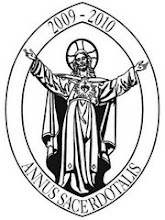PADRE PIO WAS NEVER STRIPPED OF ALL HIS FACULTIES
39 minutes ago
Thoughts about the Catholic Faith, family, education, disability and probably more.
The newspaper that carried out the strongest attack on Pope Benedict in these recent weeks is not at all “impartial.” It has an agenda that it does not hide. It is the same agenda of those who, from the vast inventory of pedophilia in the last half century in the world, fish only for those cases which — by date or place — can be bent to Pope Benedict, both as archbishop of Munich and prefect of the Congregation for the Doctrine of the Faith.This resulting world media’s attention to the Holy Father’s record, however, far from diminishing his credibility, has had the opposite effect, Magister writes.
Paradoxically, the pedophilia cases aimed like weapons at Cardinal Ratzinger by the world’s media help one understand at least this: that the current pope was truly the leader of a change in the Church’s way of facing this plague.A few media outlets do not yet get it, but a broad consensus is emerging that Pope Benedict deserves credit, not condemnation, for his now long-standing efforts to clean up filth that spilled over into parts of the Church during the “sexual revolution” of the 1960s and 1970s. During that period, as Magister notes:
A manifesto signed by French intellectuals — including Daniel Cohn-Bendit, leader of the Paris student revolutions of 1968 and today a European parliamentarian — went to the point of laying claim to pedophilia as the newest conquest. Even the victims of sexual abuse remained silent. Accusations were rare and poorly received.Ratzinger, he notes, was among the first to begin “decoding” this program for cultural disaster at a time when the New York Times (and still is) exalting sexuality as pure instinct, free from every bond."


